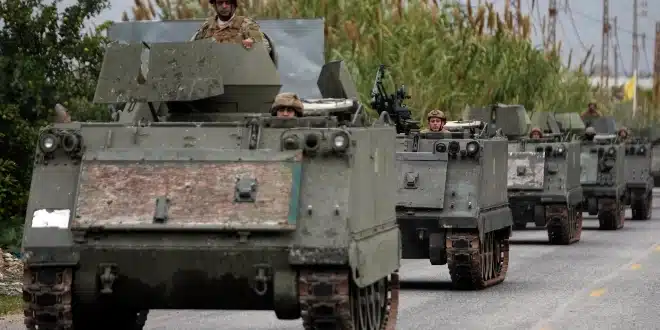The Lebanese Armed Forces issued a formal statement on Friday denouncing a series of Israeli airstrikes on the southern outskirts of Beirut. The military warned that continued Israeli operations risk undermining Lebanon’s participation in the multilateral committee responsible for overseeing the ceasefire that ended the 14-month conflict between Hezbollah and Israel.
The condemnation followed airstrikes launched by Israel earlier in the day, which targeted multiple sites in southern Beirut. The Israeli military stated that the buildings housed subterranean facilities linked to Hezbollah’s drone development efforts. The strikes occurred shortly before the start of Eid al-Adha and were preceded by a warning issued to residents to evacuate the area.
According to the Lebanese Army, it attempted to coordinate with the international monitoring committee immediately after Israel’s evacuation notice was issued. Military patrols were dispatched to the targeted zones to conduct inspections. However, Israel reportedly rejected Lebanon’s efforts to intervene or inspect the sites prior to the attacks.
Fragile Truce at Risk Amid Repeated Strikes
The ceasefire monitoring committee, which includes representatives from Lebanon, Israel, the United States, France, and the United Nations Interim Force in Lebanon (UNIFIL), was formed to ensure compliance with the terms of the truce signed in November. The Lebanese military argued that repeated Israeli violations and its refusal to cooperate with the committee are gradually weakening both the committee’s authority and the Lebanese Army’s role within it.
The military further cautioned that if such attacks persist, it may be forced to halt coordination with the committee regarding site inspections—a move that would significantly disrupt the current ceasefire monitoring framework.
Since the truce was agreed upon, Israel has conducted near-daily airstrikes in Lebanon, primarily targeting Hezbollah infrastructure and personnel. Several of these strikes have occurred in Beirut’s southern neighborhoods, a known Hezbollah stronghold.
Origins of the Conflict and Its Aftermath
The conflict between Hezbollah and Israel began on October 8, 2023, when Hezbollah launched rocket fire into Israeli territory in solidarity with Gaza and Hamas. This triggered a swift and forceful Israeli response, and the hostilities escalated into a full-scale conflict by September 2024.
Over the course of the war, more than 4,000 individuals were killed in Lebanon, including a significant number of civilians. Despite the ceasefire, the Lebanese government reported that between November 2024 and April 2025, Israeli strikes have caused an additional 190 fatalities and injured at least 485 others.
Hezbollah has faced mounting calls from both domestic political figures and international actors to disarm or scale back its military capabilities. However, the group has maintained that it will not disarm while Israeli airstrikes continue and while Israeli forces occupy five disputed points along the southern border.
According to Hezbollah officials, the group has fulfilled its obligations under the ceasefire agreement by withdrawing its fighters from positions south of the Litani River. This area had been a longstanding flashpoint in previous confrontations.


